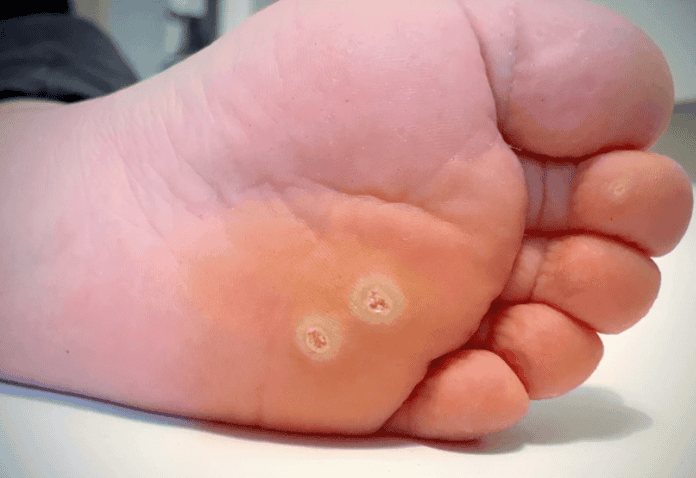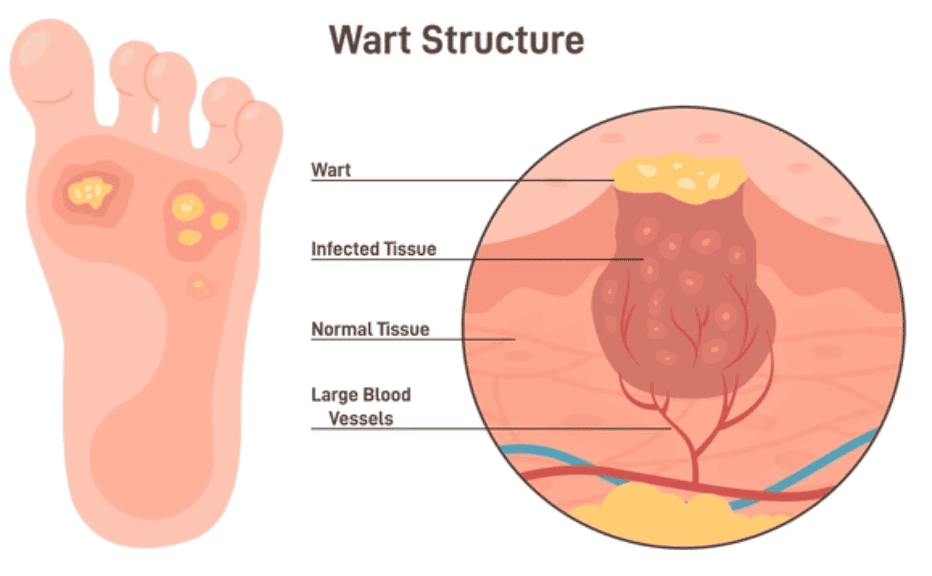Unmasking Warts: A Podiatrist's and Dermatologist's Guide to Treatment and Prevention

Warts – those pesky, often stubborn skin growths – are a common complaint that brings patients
to both podiatrists and dermatologists. While they might seem like a minor cosmetic issue,
understanding their true nature and how they spread is key to effective treatment and, ideally,
prevention.
The Viral Culprit: Human Papillomavirus (HPV)
The fundamental truth about warts, whether they appear on your hands, feet, or anywhere else on your body, is that they are caused by a virus: the Human Papillomavirus (HPV). This isn’t just one virus, but a family of over 200 related viruses. Different types of HPV tend to cause warts on different parts of the body. For example, certain types are responsible for plantar warts (on the soles of the feet), while others cause common warts on hands or flat warts on the face.
The Contagious Nature of Warts
Because warts are viral, they are inherently contagious. HPV spreads through direct skin-to-skin contact or by touching surfaces contaminated with the virus. This is why public places, especially those where people walk barefoot or share equipment, can be hotspots for transmission.
Think about the various communal venues near Martinsville, Bridgewater Center, Bradley Gardens, Green Knoll, Finderne, Somerville, Bound Brook, Manville, Weston, Raritan, Hillsborough, Flagtown, Neshanic, Woods Tavern, South Branch, North Branch, Neshanic Station, Seeley Mills, Washington Rock, Watchung, Plainfield, North Plainfield, South Plainfield, Middlesex, Dunellen, Piscataway, Society Hill, New Market, Rutgers University-Busch Campus (Piscataway), The Heights (Piscataway), Raritan Landing (Piscataway), Riverview Manor (Piscataway), Somerset (Franklin Twp), Franklin Park, Middlebush, East Millstone, Griggstown, East Franklin, Ten Mile Run (Franklin Twp), Voorhees (Franklin Twp), Franklin Center, Six Mile Run (Franklin Twp), East Rocky Hill (Franklin Twp), Clyde (Franklin Twp), Weston (Franklin Twp), Little Rocky Hill (Franklin Twp), Pleasant Plains (Franklin Twp), Zarephath, South Bound Brook, Belle Mead, Skillman, Blawenburg, Princeton North (Skillman), High Gate (Skillman), The Pointe at Turnbury (Skillman), Hickory Ridge (Skillman), Villagio (Skillman), Heather Knolls (Skillman), Plainsboro Center (partially extends into Skillman), Beekman Manor (Skillman), The Grande at Monmouth Junction (Skillman), Nassau Square (Skillman), White House Station, Whitehouse, Three Bridges, Rowland Mills, Readington Village, Dreahook, Mechanicsville (Readington Twp), Riverside (Readington Twp), Stanton, Flemington, Far Hills, Gladstone, Peapack, Oldwick, Pottersville, Annandale, Clinton, Lebanon, Asbury, Hampton, Glen Gardner, High Bridge, Califon, Chester, Mendham, Bernardsville, Basking Ridge, Liberty Corner, Lyons, Gillette, Stirling, Millington, Meyersville, Green Village, New Vernon, Long Hill, Berkeley Heights, New Providence, Scotch Plains, Fanwood, Westfield, Garwood, Clark, Roselle, Cranford, Springfield, Kenilworth, Union, Roselle Park, Elizabeth, Linden, Rahway, Woodbridge, Iselin, Colonia, Avenel, Port Reading, Sewaren, Carteret, Edison, Metuchen, Highland Park, East Brunswick, South River, Helmetta, Spotswood, Monroe Township, Jamesburg, Dayton, Monmouth Junction, Kendall Park, Princeton, Kingston, Rocky Hill, Montgomery, Griggstown, Hopewell, Pennington, Ewing, West Windsor, East Windsor, Robbinsville, Lawrence Township, Hamilton Township (Mercer County), Trenton (partially), North Brunswick, South Brunswick, Milltown, East Millstone, Somerset (portions of), Blackwells Mills, Zarephath.
These include public indoor swimming pools, outdoor community pools, health club pools, community aquatic centers, hotel swimming areas, water parks, large chain gyms with shared locker rooms, independent fitness studios with communal changing areas, community recreation centers with workout facilities, yoga or pilates studios with shared mats or props, indoor sports complexes with shared equipment or facilities, public locker rooms and changing areas, communal showers, public restrooms (especially floors), martial arts or dance studios, spas, and saunas. Even other public venues where people gather or share spaces can facilitate spread. If you or your child frequent these or other local spots, it’s wise to wear flip-flops or water shoes in wet areas and practice good hand hygiene, especially after touching shared surfaces.
Once the virus enters the skin through tiny cuts or abrasions, it can cause skin cells to grow rapidly, resulting in the characteristic bumpy appearance of a wart. The incubation period can vary widely, from a few weeks to several months, meaning you might not even realize you’ve been exposed until a wart suddenly appears.

Treatment Approaches: A Dual Perspective
Both podiatrists and dermatologists are highly skilled in treating warts, often employing similar methods tailored to the wart’s location and severity.
From the Podiatrist's and Dermatologists Chair: Focus on Warts
Podiatrists, like Dr. Sanghvi at PS Foot and Ankle and Dermatologists like Dr. Patel at PS Dermatology and Surgery (both at 245 Union Ave, Bridgewater, NJ), specialize in conditions affecting the feet and skin respectively. Plantar warts, which grow inwards due to the pressure of walking, can be particularly painful and challenging to treat. Podiatrists and dermatologists frequently use:
- Cryotherapy: This involves freezing the wart with liquid nitrogen. The extreme cold destroys the infected cells, leading to a blister that eventually peels away, taking the wart with it. Multiple sessions are often required for complete resolution.
- Topical Salicylic Acid: This is a common and effective over-the-counter and prescription treatment. Salicylic acid works by gradually dissolving the layers of the wart. Podiatrists can prescribe stronger concentrations than those available commercially, often combining it with debridement (careful shaving down of the wart) for better penetration and efficacy. This method requires consistent application over several weeks or months.
- 5-Fluorouracil (5-FU): This is a topical chemotherapy cream that works by interfering with the growth of abnormal cells. It’s often reserved for stubborn warts that haven’t responded to other treatments and is applied carefully under medical supervision.
- Other Topical Medications: A less common but possible option include other topicals such as imiquimod, which stimulates the immune system to fight the virus, or cantharidin which causes controlled blistering to destroy the wart, or topical cidofovir, which is an antiviral, against wart particles.
- Surgical Excision/Curettage: In some cases, particularly for larger or resistant warts, your doctor might choose to scrape away (curettage) the wart or in rare cases surgically cut out (excision) the wart.

The Power of Prevention: HPV Vaccine
The most impactful way to combat the spread of warts, and more importantly, prevent HPV-related cancers, is through vaccination. The HPV vaccine (such as Gardasil 9) protects against the types of HPV that cause the vast majority of warts and cancers of the cervix, anus, throat, and other areas.
The Centers for Disease Control and Prevention (CDC) recommends routine HPV vaccination for preteens at ages 11 or 12, though vaccination can be started as early as age 9. Catch-up vaccination is also recommended for individuals through age 26 who haven’t been fully vaccinated. While the vaccine is most effective when given before any exposure to the virus, even sexually active individuals can benefit by protecting them against HPV types they haven’t yet encountered. Discussing the HPV vaccine with your primary care physician is a crucial step in proactive health for yourself and your family.
When to Seek Professional Help
While some warts may resolve on their own, or with over-the-counter treatments, it’s always best to consult a professional for diagnosis and treatment. This is especially true if:
- The wart is painful, bleeding, or changing in appearance.
- You have multiple warts or they are spreading rapidly.
- You have a weakened immune system.
- You are unsure if the growth is a wart or something else.
For expert care for foot warts, reach out to Dr. Sanghvi at PS Foot and Ankle at 245 Union Ave in Bridgewater, NJ. For warts on other areas of the body, a dermatologist such as Dr. Patel at PS Dermatology and Surgery (also at 245 Union Ave, Bridgewater, NJ) can provide comprehensive diagnosis and treatment. Don’t let warts linger – take control of your skin health!

